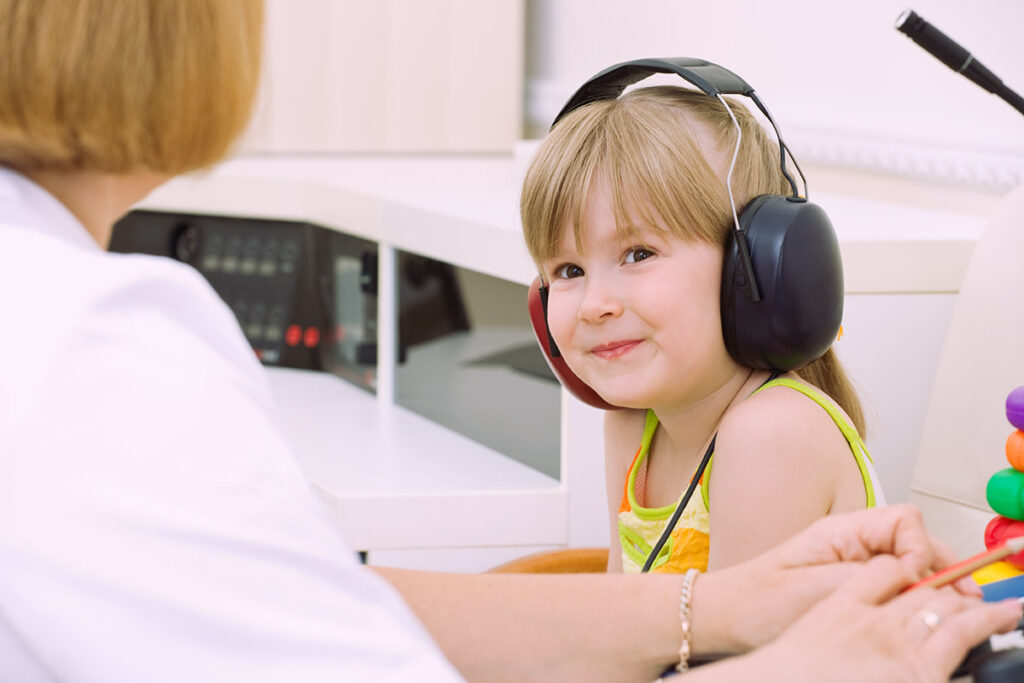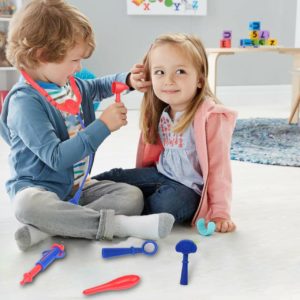
Does your toddler have an upcoming hearing test with an audiologist?
Kelly Schlicher, FHSR’s Education Intern and an audiology student at RUSH University shares some tips that can help prepare your child for a hearing test.
Here are some things you can do ahead of time to help prepare them for the experience.
1. Desensitize your child’s ears.
During the audiology appointment, there is going to be a lot of attention placed on your child’s ears. If they have never had their ears touched before, the experience could be off-putting. In the days leading up to the appointment, try playing a game of pretend ear doctor with your child. Parents can begin by gently placing their hands near the child’s ears and gradually progress to more interactive activities, such as playfully looking into the ear. This approach helps familiarize the child with the process in a gentle and engaging manner.
In the days leading up to the appointment, try playing a game of pretend ear doctor with your child. Gently tug on the top part of their ear and look inside their ear canal. Let your child pretend to be the doctor and take a look inside your ear. If you have a play doctor kit at home, investigate one another’s ears with the otoscope, like the one shown below. et your child pretend to be the doctor and take a look inside your ear.
Make silly jokes about what you might find in the ear, like tiny dinosaurs or hidden treasures. This can make the experience fun and help your child relax. If your child is still hesitant, encourage them to practice on you first. This way, they can see that it’s not intimidating and feel more comfortable when it’s their turn for you to touch theirs.
Talk to your child about how the otoscope works like a magnifying glass and a flashlight at the same time! It lets the doctor see deep inside of the ear and check if it is healthy. You can also familiarize them by letting them point to parts of the ear, such as the pinna and the ear canal. This gives them a sense of control over the experience.

2. Practice wearing headphones.
An audiology exam is more effective if the child is comfortable wearing headphones or earbuds. This allows the audiologist to get ear specific information. In the days leading up to the appointment, familiarize your child with headphones or earbuds. Help your child get used to having something in the ears by putting headphones or earbuds on them while they are doing something they already like, like watching a movie or driving in the car. You can play music through the headphones, but make sure it is not too loud. If you use headphones or earbuds yourself, invite the child to join in and listen along with you. It’s a great way to share the activity together.

3. Work on repeating words on cue
Speech testing happens at different levels tailored to various developmental ages, with some requiring the child to repeat words back to the audiologist. Before your child’s audiology appointment, practice having them repeat words back to you. These words can be simple and ones commonly used by the child. For example, ask them to repeat words by showing them familiar objects and having them repeat: “Say dog. Say spoon. Say cup.” If your child is unable to repeat words, encourage them to respond by pointing instead: “Point to the dog. Point to the spoon. Point to the cup.”
This mimics a task that the audiologist might perform during the appointment. Another great way to engage your child with sound would be to bring attention to everyday sounds your child may hear. If the doorbell chimes, say “Listen, do you hear that?” Incorporating these activities into everyday life allows the child to engage without feeling pressured, and it can help enhance your child’s language and recognition skills.
4. Try a conditioned play activity.
A big part of testing toddlers is what’s called conditioned play audiometry.
This is when the child performs a simple action, typically in the form of play, in response to a sound they hear. While every clinic is different, these actions can include putting a peg on a board, dropping a ball in a bucket, or building a block tower. Practicing this task at home can sometimes be challenging for children to grasp. However, familiarity with the task at home can make the testing process more efficient and comfortable for the child.For example, when your child is cleaning up their blocks, have them wait for you to say, “beep” before putting each block in the bucket. Our goal as audiologists is to disguise the hearing evaluation as a game. This “play” aspect helps to keep the child engaged and happy while testing.
Here is a video example of conditioned play audiometry:
A hearing test can be nerve wracking for parents and children alike, but practicing these simple parts of the appointment at home takes the newness out of the experience for the child. Taking the time to do some preparation before your visit will help make the trip to the audiologist less intimidating and more enjoyable for everyone involved.
This Blog was updated by Kelly Schlicher, a third-year doctoral student in audiology at Rush University. Kelly enjoys working with both pediatric and adult patients in the clinic and serves as the Education Intern for the Foundation for Hearing and Speech Resources (FHSR).



